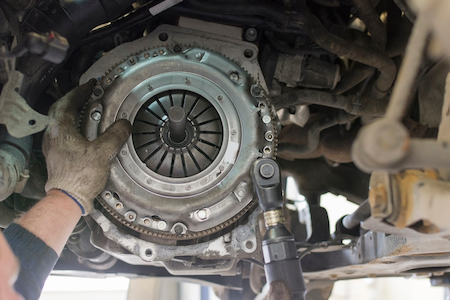Clutch failure. Even if you aren’t quite sure what it means, it sounds bad.
Like other parts of your vehicle, the clutch is only designed to last for so long before it starts to wear down. Both manual and automatic transmissions have clutches designed to engage the transmission and harness the power to move the wheels throughout a full cycle. As you move out of park and start moving, the clutch engages. As you come to a stop, the clutch engages.
Manual transmission vehicles create movement between gears manually using a clutch pedal. An automatic transmission creates this movement automatically. In both cases, there is constant movement and friction as the gears move into place. Over time, enough wear will occur to wear down the clutch, requiring repair or replacement to ensure your safety.
How do you know which it is? Is it time to repair or replace the clutch in your car? Read on to find out how you’ll recognize the symptoms.
What is a clutch? Why does my car need a clutch?
Before you can diagnose clutch problems, learning more about its function can help you recognize potential problems early.
A clutch is a mechanical device that engages and disengages the transmission between several rotating shafts. A clutch is a connection point between two shafts, allowing them to lock and spin together, or disengage to operate separately.
In most vehicles, the clutch sits between the engine and the main driveshaft. It takes power from the engine and transfers it to the wheels. While an engine spins and creates power continuously, your wheels don’t. To gain control over the wheels without turning off the engine, you need a way to operate the two separately. This happens between the clutch disc and the engine’s flywheel, giving you full access to control power and speed in any condition.
A traditional clutch will contain a variety of parts, including:
- Clutch disc – the connection point to the transmission
- Cable – connects the clutch pedal to the clutch fork
- Clutch fork – controls the force between the clutch and the pressure plate
- Pressure plate – connects to the clutch disc
- Flywheel – connects to the engine
Each piece is connected via links, cables, and other bearings to ensure it maneuvers correctly. If any one of these parts starts to fail, you’ll notice it in the way your car performs. A few things that can go wrong include:
A slipping clutch
A clutch can have anywhere from 50,000 to 100,000 miles before it needs repair or replacement. As the clutch wears down, the material begins to wear out, and it won’t perform as it did when it was new. A clutch needs friction to engage. Without the proper friction, the clutch won’t work as well as it should. That means you may feel the clutch slip as you accelerate, and the clutch moves between gears. It’ll feel like your vehicle is dragging, even though the engine may be revving up.
A slipping clutch can be caused by a variety of problems, including:
- A cable that needs adjusting
- A clutch linkage is bent or damaged
- The pressure plate is weak or warped
- The clutch assembly is dirty from oil or grease leaks
- A broken motor mount
As it slips between gears, it may also become sensitive to movement, or even get stuck. For a manual transmission, you may notice this if you press down on the clutch pedal and it slips out of gear immediately, or you have to push it all the way to the floor without movement. Clutches can stick for various reasons, including:
- A broken or stretched clutch cable
- Leaky or defective clutch master cylinder
- Air in the hydraulic line
- Clutch components out of sync
- Linkage out of adjustment
A clutch master cylinder failure
Clutch failure can originate in the clutch master cylinder for a variety of reasons. With each potential problem, it creates signs that something is wrong. You’ll notice a problem in different ways.
Noises – when parts aren’t properly synced and working well, the friction between the parts will create a variety of sounds. With a manual transmission, you might hear a noise as you press the clutch pedal to the floor, even if the engine is turned off. That’s an indicator of a clutch fork problem. As lubricant dries up, it can cause a noise as it tries to engage.
Vibrations – as you press down on the pedal, you may feel a vibrating sensation from time to time. Vibration can be caused by a variety of things, but usually starts as things wear down. Friction no longer occurs between separate parts, meaning they rub against each other incorrectly. This appears as a vibration as they try to engage.
Spongy or loose feel – this is often caused by a hydraulic problem. There may be air in the hydraulic system, low fluid in the reservoir, or a leaking connection, hose, or pipe somewhere in the system.
Grinding while shifting gears – there should always be free-flow as your car moves from gear to gear. When you start feeling or hearing the process, it’s a sign of a worn down part. Any one of the parts that make up the clutch system isn’t moving correctly at the right speed. Instead of moving into position, it sticks or drops quickly. You’ll hear it as parts don’t connect as intended. It may require an adjustment, or a full replacement.
What can it be? An inspection will get to the root cause
Each symptom is a signal it’s time to bring your car in for an inspection. It’s the easiest way to get to the root of the problem, and fix it before it escalates into something else. In some cases, it might be a simple repair. It’s better to know for sure before it escalates, causing more damage, and potentially putting you at risk.

